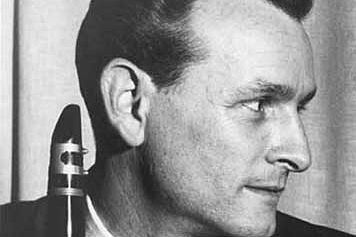
Jimmy Giuffre, a jazz musician who composed a popular big-band anthem of the 1940s and became an innovator of a minimalist form of classically inspired jazz, died April 24 at Berkshire Medical Center in Pittsfield, Mass. He had Parkinson's disease and would have turned 87 today.
Mr. Giuffre (pronounced JOO-free) had his greatest early fame as the composer of “Four Brothers," a popular instrumental hit for Woody Herman's big band in 1947. Later, after a stint in the saxophone section of Herman's big band, Mr. Giuffre formed a series of trios that explored what he called “blues-based folk jazz."
His groups, invariably called the Jimmy Giuffre 3, often included guitarist Jim Hall and blended advanced musical techniques with a homespun, back-porch feeling. Mr. Giuffre, who played clarinet, tenor saxophone and baritone saxophone in the 1950s, gained modest popularity in the late 1950s and was featured in the documentary “Jazz on a Summer's Day," filmed at the 1958 Newport Jazz Festival.
Later, as his ideas reached beyond the mainstream, Mr. Giuffre lost his audience and concentrated on teaching and composing. In the past 10 years, however, as his early recordings were re-released, he was recognized as a subtle and forward-thinking jazz pioneer.
“Jimmy followed his own angel," trombonist Bob Brookmeyer, a former member of Mr. Giuffre's trio, said yesterday. “He was one of the most courageous and dedicated men I ever met. He didn't care about what was profitable. He did what he felt was necessary."
After early experience in jazz bands, Mr. Giuffre took an interest in counterpoint, fugues and other elements of classical music. He became identified with John Lewis, George Russell, Gunther Schuller and other musicians who sought to blend jazz and classical music in a style known as Third Stream.
Mr. Giuffre's approach was decidedly understated. His “chamber jazz" trios had neither piano nor drums and instead relied on Hall's guitar and Mr. Giuffre's saxophones or his warm, dusky-sounding clarinet. The result was a fresh, open sound that was both forward-looking and reminiscent of Appalachian jug bands.
Mr. Giuffre (pronounced JOO-free) had his greatest early fame as the composer of “Four Brothers," a popular instrumental hit for Woody Herman's big band in 1947. Later, after a stint in the saxophone section of Herman's big band, Mr. Giuffre formed a series of trios that explored what he called “blues-based folk jazz."
His groups, invariably called the Jimmy Giuffre 3, often included guitarist Jim Hall and blended advanced musical techniques with a homespun, back-porch feeling. Mr. Giuffre, who played clarinet, tenor saxophone and baritone saxophone in the 1950s, gained modest popularity in the late 1950s and was featured in the documentary “Jazz on a Summer's Day," filmed at the 1958 Newport Jazz Festival.
Later, as his ideas reached beyond the mainstream, Mr. Giuffre lost his audience and concentrated on teaching and composing. In the past 10 years, however, as his early recordings were re-released, he was recognized as a subtle and forward-thinking jazz pioneer.
“Jimmy followed his own angel," trombonist Bob Brookmeyer, a former member of Mr. Giuffre's trio, said yesterday. “He was one of the most courageous and dedicated men I ever met. He didn't care about what was profitable. He did what he felt was necessary."
After early experience in jazz bands, Mr. Giuffre took an interest in counterpoint, fugues and other elements of classical music. He became identified with John Lewis, George Russell, Gunther Schuller and other musicians who sought to blend jazz and classical music in a style known as Third Stream.
Mr. Giuffre's approach was decidedly understated. His “chamber jazz" trios had neither piano nor drums and instead relied on Hall's guitar and Mr. Giuffre's saxophones or his warm, dusky-sounding clarinet. The result was a fresh, open sound that was both forward-looking and reminiscent of Appalachian jug bands.
For more information contact All About Jazz.



























